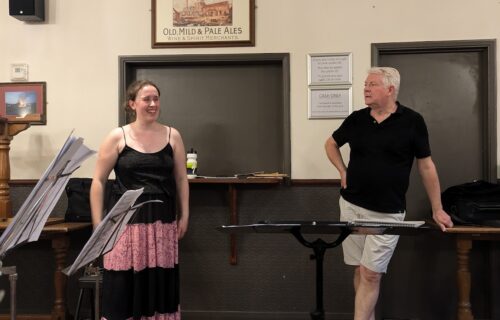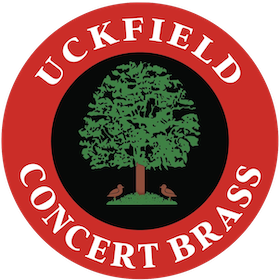
Q&A with Emily
Members of the Uckfield Concert Brass put questions to our resident composer, Emily Hazrati, for this Q&A about how she works, what it’s like to write music for a brass band and what she hopes to gain from the experience.
Working with Uckfield Concert Brass
In the early stages of my career, particularly within collaborative art forms such as opera, I have become drawn to incremental, process-led approaches to composition; with performers, writers and other collaborators playing a significant role in my creative processes.
Making Music’s Adopt a Music Creator Scheme felt like the perfect fit for this aspect of my practice – I was enticed by the opportunity to collaborate with an ensemble regularly over the course of a year, and by the challenge of working with a leisure-time ensemble in greater depth and scale than I had previously experienced.
Whilst spanning a variety of genres, the vast majority of my portfolio involves voices, narrative and text in some form: from art song and opera to choral and vocal ensemble music.
So to challenge myself even further, I applied for Adopt a Music Creator stating that I was keen on working with a large instrumental group.
You can imagine how delighted I was when months later, Uckfield Concert Brass were announced as my partner ensemble for the year! The prospect of working with a brass band and its unique sound felt incredibly exciting, although I quickly realised how many new instruments there were to get to grips with…
Many of my preconceived ideas about the genre were informed by conversations with friends who played in brass bands, as well as snippets from my own lived experience. Most of the sounds I had in mind were march figurations, Christmas carols, and some of the music I played in my university’s wind orchestra.
I was therefore surprised by the breadth of mood, colour and texture in the repertoire Uckfield Concert Brass showcased at our first meeting in January – it felt like an assault on the senses in the best possible way!
A sense of warmth was apparent not only from the band’s generous sound, but from the friendship and camaraderie amongst its players. These qualities came to the fore in their rendition of Bohemian Rhapsody, which was my personal highlight from that evening.
It was also clear that this group relished a challenge, as was evidenced by their fearless tackling of repertoire as virtuosic as Kenneth Downie’s Purcell Variations. Nick also kindly scored an excerpt of one of my choral pieces Drop down, ye Heavens, from above for the band to try – I was seriously impressed by the band’s sensitive and musical approach to the piece, and touched by the players’ kind words about what I’d written.
My first experience of Uckfield Concert Brass left me feeling motivated and inspired to start composing.
I began to look for inspiration from Uckfield and the surrounding area of Sussex: much of my work is preoccupied with place and origin, and I was keen on finding a starting point that drew on the specific qualities of the band and its context in the widest possible sense.
To focus these thoughts, I brought along two concepts for our creative workshop in March, where the band played through short musical sketches I’d written, as well as making their own music and text responses to these prompts.
One of my ideas came from looking into the etymology of ‘Uckfield’, which roughly translates to ‘open land of a man called Ucca’. This Old English personal name is a pet form of the Anglo Saxon name ‘Uhtraed’, meaning ‘dawn-wisdom’. Upon making this discovery I was absorbed by an image of the sun rising in a distant past, and before I knew it I had composed a fragment of music inspired by this vision.
I brought the musical sketch for the band to play and asked them to describe in words what in this excerpt resonated – their responses enriched and brought new ideas which informed how I then expanded the fragment, from descriptions of a calm, warm, hazy autumnal morning to suggestions of mystery and ritual.
From this workshop emerged the overarching concept of Dawn, Wisdom: three movements capturing an imagined sighting of dawn over the Sussex landscape surrounding Uckfield, with movement titles taken directly from the players’ own text responses.
The first movement ‘Mist over the River Uck’ expands on the hazy, blurry sonorities in my musical sketch whilst introducing a menacing, ritualistic middle section; whilst the second movement
The second movement, ‘Morning sun, hitting the peaks of a rocky landscape’ depicts brighter, more defined flashes of sunlight as morning emerges from the initial embers of dawn. These are to be followed by a lengthier third movement, still wet on the page, developing the ideas in these two portraits and combining their thematic content as the day well and truly begins.
Collaborating with Uckfield Concert Brass is already expanding my creative horizons and allowing me to apply my narrative-led approach in an entirely new context, adding a valuable new dimension to my creative and collaborative skillset.
I hope that Dawn, Wisdom becomes a piece that the band feel a close, meaningful affinity to, enjoy playing and will be eager to perform beyond its world premiere in October. I also hope this experience encourages this group and brass bands across the UK to play more and more new music, and work with more and more living composers in their future endeavours.
Your musical experience and practice
My first composition was a Christmas carol for upper voices, which I wrote when I was 11 and entered for a carol competition. The parameters of this first experience actually set a precedent for many of my interests now: writing for voices, working with text and narrative, composing to a specific brief…
For me, hearing performers bring my music to life was a key aspect of what inspired me to start composing. I was lucky to hear compositions of mine performed from quite a young age, and I found the experience of having musical ideas, writing these down and hearing these realised by an ensemble to be utterly transformative. Emulating others’ music and using composition as a means of emotional expression were also important factors, which likely came hand-in-hand with that prospect of live performance.
All sorts, but especially ensembles involving voices – including art song (solo voice and accompaniment), choirs, and chamber opera. I also frequently compose for instrumentalists on a chamber scale: string quartet, solo guitar, cello and piano, chamber orchestra, Pierrot ensemble, wind quintet… The list goes on! I’m about to start writing a new work for symphony orchestra as part of London Symphony Orchestra’s Panufnik Composers scheme, which is really exciting new territory for me at this stage in my career.
Generally, I have to start with an extra-musical idea before formulating musical material using the piano, manuscript paper and notation software. This could involve a combination of narrative, sounds and landscapes from the natural world, a specific place and its qualities, archival material, or a broader concept that blends a mixture of these influences.
It’s an interesting question, because the nuances of this have constantly evolved over the course of my artistic journey. One thing that’s always been central to informing my composing style is going to see as much live music as possible. Those are the experiences that stick with me and permeate my compositional language over time. I can still remember hearing Ravel’s music for the first time and having the first of many lightbulb moments: a process which continued at the BBC Proms I attended as a teenager. Even more important to me now is supporting and being influenced by my fellow creatives and their work, which is where I have the majority of my creative epiphanies as a working composer.
My first musical instrument was the recorder, which I began to learn at primary school aged 5 or 6. I played seriously for quite some time, taking my Grade 8 when I was 15 and joining several early music ensembles and recorder consorts at university. I’m a huge advocate for the instrument – its breadth of sound and repertoire is highly underestimated, and I’ve even composed a couple of pieces for the recorder since learning to play myself!
I started playing piano when I was 7 and clarinet when I was 10, learning both to Grade 8 standard and taking a diploma in piano during my final year of school. Nowadays I don’t practice any of my instruments professionally, but still enjoy playing piano in my spare time, and have fond memories being a clarinettist in student orchestras and ensembles. Besides my instruments, I sing with several choirs in London, and cherish both the unique community and musical experiences singing with a group on a regular basis offers.
My dream is to transcend the unhelpful boundaries we encounter all the time in classical music. For me, this means writing music and telling stories that resonate across multiple cultural and socio-economic backgrounds, as well as forming meaningful, empathetic collaborations with as many wide ranging artists and communities as possible. I also hope that as my career progresses, I can encourage as many people as possible to compose or engage with new music. It’s such a unique form of self-expression, which I think the world desperately needs more than ever before.
Your musical likes and dislikes
Beatles No.1 album (streamed by my parents on my behalf when I was a toddler, if that counts). This was the first music I remember hearing, and I still adore it to this day!
None that I can think of right now…
Ravel’s Piano Concerto in G. I discover something new every time I listen; it’s just so endlessly beautiful, colourful, intricate, and perfectly crafted.
Too many to list! (Right now it’s ‘Bruce’ from Matilda the Musical, Careless Whisper by George Michael, and the theme from Tchaikovsky’s Swan Lake…)
This varies enormously depending on the time of year. At the moment I’m really enjoying listening to an Iranian folk song called ‘Ascending Bird’, arranged by composer Colin Jacobsen and Santur player Siamak Aghaei. I also love listening to BBC Radio 3.
In some cases, I think that’s true. I teach composition at a Saturday music centre and as part of Music in the Round’s ‘WeCompose’ secondary music education programme, as well as giving piano lessons to several private students.
One thing I’ve noticed is that, whilst technique is essential to becoming a good musician, sometimes the moment of inspiration comes from showing students a piece of music they may not have encountered before, and inviting them to respond with their own thoughts and feelings. Our job as educators is to then provide the technical context and toolkit, for them to understand and apply that initial inspiration – I think sometimes having a starting point that is purely technical can be creatively stifling, and perhaps not as immediate to grasp.

Comments:
No comments to display.